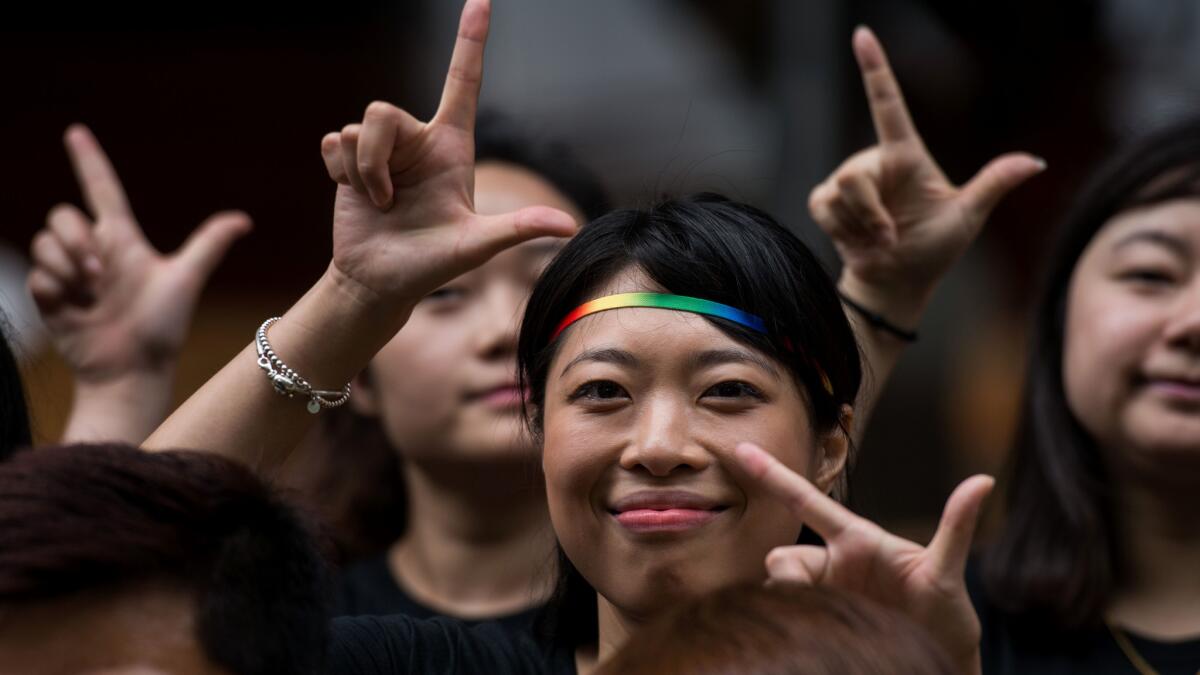In China, transgender films find a home at the ShanghaiPRIDE Festival

Kaspar Wan’s gender reassignment surgery in 2012 solved some of his problems, but left many untouched. How would he reconcile his identity with his Christianity? Would his parents accept him for who he was?
In a short documentary about his transition, “If I Had a Soul,” Wan, a Hong Kong-based director and transgender rights activist, said that the surgery was “about aligning my inner and outer selves.” Yet his elderly mother struggled to understand. “I once thought if he insisted [on getting surgery], I would disown him,” she says in the film. “And then I’m thinking he’s all grown up, so do I really want to disown him? Do I want to ruin the relationship because of this?”
Wan’s documentary screened on Sunday at the opening of the second annual ShanghaiPRIDE Film Festival, a showcase of Chinese and foreign lesbian, gay, bisexual, transgender and queer (LGBTQ)-themed cinema. (It won second place in the festival’s short films contest). The event will feature 40 films over 10 days, according to its website, and focus specifically on “films about transgender and non-binary experience.” About half of the films are foreign, and half are Chinese.
The festival comes as China slowly turns a corner on social attitudes towards homosexuality and transgenderism. Although Beijing stopped classifying homosexuality as a mental illness in 2001, much of Chinese society still subscribes to traditional gender norms, and many parents put their children under enormous pressure to enter heterosexual relationships, marry and start families of their own. China’s political environment also makes advocacy difficult — protests and marches are virtually banned, and the state views nongovernmental organizations with suspicion.
Yet attitudes are changing. In recent years, Chinese courts have heard several landmark legal cases about gay marriage, “gay-straight conversion therapy” and university textbooks’ treatment of homosexuality. One web series about a homosexual relationship went viral before government censors took it down.
Charlene Liu, 43, a cofounder of the volunteer organization ShanghaiPRIDE and an 11-year Shanghai resident, said that the ShanghaiPRIDE Festival — a broader program featuring the film festival as well as panel discussions, parties, exhibitions and a fun run — has expanded since its founding in 2009.
“Last year we had 6,000 participants throughout the whole pride week,” she said. “It’s good progress. We’re not as big as pride [festivals] overseas, like in L.A., San Francisco, Sydney and London. But given the situation we’re in, I think we’re progressing.”
A few hundred people attended the festival’s opening ceremony on Sunday, packed shoulder-to-shoulder at a low-lit bar in Shanghai. Organizers played an opening video that showed city scenes interspersed with same-sex couples sharing intimate moments; they then screened Wan’s documentary, followed by a short film about a young woman caught between the affections of her boyfriend and a female friend.
“The past twelve months have seen a burst of high-profile legal battles and discussions on LGBTQ, with the primary discourse being on same-sex union and the pink market,” said Matthew Baren, 28, a British citizen and film festival organizer, in opening remarks. “Not so long ago, this was unimaginable. So is it better to put all our energies into mainstream battles and not divert them to gender minorities?”
“Film is very important to the LGBT movement in China,” he said later, in an interview. “We figure film is important — it’s how you reach people. There are festivals in Beijing and Guangzhou, and they’re popping up across the country.
“So much of [LGBTQ cinema] is dominated by the West,” he continued. “We wanted to support Chinese stories, Chinese faces.”
Raymond Phang, 27, ShanghaiPRIDE’s chief planner, said that LGBTQ-themed cinema has expanded significantly in recent years, both in China and abroad. “I think ‘Brokeback Mountain’ really did it,” he said. He added that Chinese LGBTQ films tend to focus more on family than their Western counterparts, as “family in Asian culture is very important.”
“I wouldn’t say this is a mature market, because of the limitations,” he said. China’s film market is government-controlled, and the country’s LGBTQ-themed films have yet to achieve widespread distribution.
Phang added: “The filmmakers are independent…. They are exploring, even themselves. Now filmmakers are trying to explore transgenderism. They’re taking a different approach.”
ALSO:
This documentarian is fighting back against gay culture’s ‘No Fats, No Femmes’ mantra
When Prince bended gender, he gave black men permission to be free
Why Laverne Cox is lending her voice to the ‘Free Cece’ documentary
More to Read
Only good movies
Get the Indie Focus newsletter, Mark Olsen's weekly guide to the world of cinema.
You may occasionally receive promotional content from the Los Angeles Times.






